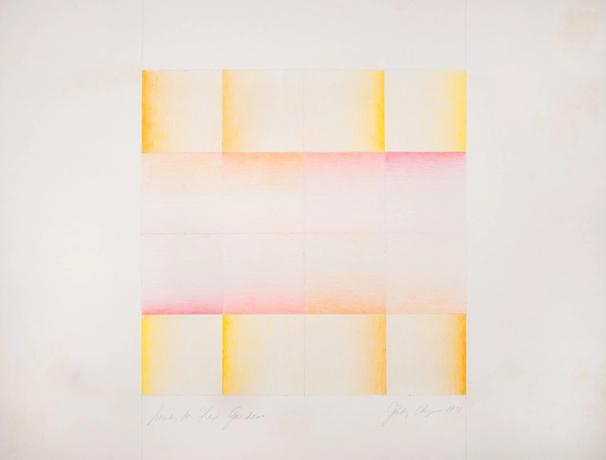
GAVLAK Presents Judy Chicago: Early Works
Frieze Masters Spotlight
Regent’s Park, London
October 9 - 13, 2024
GAVLAK is pleased to announce its participation in Frieze Masters, London, with a solo presentation of Judy Chicago’s early works, focusing on the first decade of her illustrious career. This presentation offers a rare opportunity to explore Chicago’s significant contributions to minimalism and color theory, positioning her within a history of art concerned with reductive form and color, beyond her well-known status as a pioneering feminist artist.
From 1965 to 1973, Chicago created drawings, paintings, and sculptures that delve into the emotional power of color through a reduced formal vocabulary of geometric shapes. The works on display at Frieze Masters Spotlight will highlight this critical period, offering the viewer an intimate look at the complexity and innovation of Chicago’s early artistic production.
Key works in the presentation include Flowering Glass (1973/2023), a hand-painted glass lightbox that revisits the artist's iconic painting, Through the Flower 2 (1973). Here, Chicago created icons of women’s empowerment in the form of colorful, pulsing abstractions. Radiating out from a whole or nucleus like a star, flower, or erogenous vortex, these images of the feminine lifeforce are among the artist’s most celebrated works. Chicago writes in her autobiography, Through The Flower: My Struggle as a Woman Artist, “I felt myself …moving through the limits of the female role. I used the flower as a symbol of femininity…the petals of the flower are parting, and one can see an inviting but undefined space, the space beyond the confines of our own femininity…my longing for transcendence…my first steps in being able to make clear, abstract images of my feelings as a woman.”
Also on view is a series of ombre Prismacolor works on paper from Judy Chicago’s early minimalist period. These works investigate the geometry of feminine flesh and explore color as a means of transformation and perceptual awakening. In pieces like Childhood’s End #2 (1972), Chicago employs a reduced formal vocabulary of geometric shapes, such as bold spheres and divided squares, to evoke personal abstraction, offering an intimate glimpse into her emotional landscape. In works such as Dome Drawing #3 (1968), circular trifectas, sometimes called "whirling donuts," spin color around a central core with the electricity of female orgasm. For Chicago, who spent her formative years in the blushing light of Los Angeles and has long lived under the prismatic skies of the New Mexico desert, color’s ability to convey emotive states is integral to her practice and deeply intertwined with her female-centered imagery.
Chicago is widely recognized for her revolutionary impact on contemporary art and feminist discourse. Best known for her iconic installation The Dinner Party (1974-79), which is on permanent view at the Brooklyn Museum, New York, Chicago has spent over six decades challenging the male-dominated art world and advocating for the inclusion of women’s achievements in history. Her multifaceted practice encompasses painting, sculpture, installation, and performance, often exploring themes of gender, birth, death, and the environment. Through projects like the Birth Project (1980-85) and The End: A Meditation on Death and Extinction (2012-18), Chicago has continuously pushed the boundaries of art-making, using her work to provoke thought and inspire change.
This presentation comes on the heels of Chicago’s recent major exhibitions at LUMA Arles, France (June 30–September 29, 2024), Serpentine Gallery, UK (May 23–September 1, 2024), and the New Museum, New York (October 12, 2023–March 3, 2024). Her work is also the subject of the book Revelations, a radical retelling of human history in the form of an illuminated manuscript, published by Thames & Hudson, in collaboration with Serpentine.
About the Artist
Judy Chicago is an artist, author, feminist, and educator whose career spans nearly six decades. Her work has been the subject of major retrospectives at LUMA Arles (2024), Serpentine (2024), the New Museum (2023), and the de Young Museum (2021), and is in the collections of The Art Institute of Chicago; The Brooklyn Museum; The British Museum; the de Young Museum; The Getty Trust; The Hammer Museum; the Los Angeles County Museum of Art; the Metropolitan Museum of Art; Moderna Museet; The Museum of Contemporary Art, Chicago; the Museum of Contemporary Art, Los Angeles; the San Francisco Museum of Modern Art; the Tate; and more than twenty-five university art museums. She is the author of sixteen books, including The Flowering: The Autobiography of Judy Chicago and Revelations published by Thames & Hudson.






